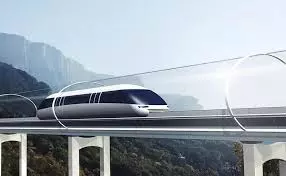AA Edit | Hyperloop too costly for India?
Hyperloop is an advanced transportation system in which a capsule travels through vacuum tubes at supersonic speeds of Mach 1 or 1,200 km per hour

The development of a 422-metre hyperloop test track by a team of engineers from IIT Madras, in collaboration with Indian Railways, is a milestone in India’s technological journey. While it is just the first step in the long journey towards developing a functional model of hyperloop transportation system, the test track lays the basic foundation for the future progress.
Hyperloop is an advanced transportation system in which a capsule travels through vacuum tubes at supersonic speeds of Mach 1 or 1,200 km per hour. The capsule, which carries either passengers or freight, levitates as it moves in the charged pod. Though hyperloop technology is still at a nascent stage across the world, it can offer a green alternative to the existing high-speed transport systems such as air travel.
Questions, however, are being raised in some quarters about India’s focus on hyperloop — which has no working model in any country yet — instead of Maglev (magnetic levitation) trains, which have been operational in several places for over a decade. The cost of building a hyperloop is estimated to be between $100 million and $200 per kilometre, whereas Maglev trains could be built for $50 million to $80 million per kilometre.
Currently, a hyperloop connecting Chennai and Bengaluru, which are 343 km apart, would cost between $34.3 billion (Rs 2.95 lakh crores) and $68.6 billion (Rs 5.83 lakh crores), while a Maglev would cost half that amount. Though Indians may not afford such high-cost transportation at present, the wider adoption of technology around the world could eventually make it affordable.
Notwithstanding the affordability or feasibility of hyperloop for commercial use, the IIT Madras team must be appreciated for its members’ efforts to master advanced technologies, as it will have several positive ripple effects. Just as the Mangalyaan project sparked interest among Indian children for science, especially engineering, the hyperloop project could inspire hundreds of thousands of young minds to pursue careers in science, helping India to become a scientific superpower.
